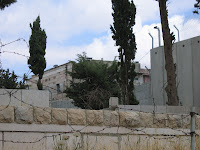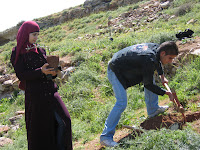
Of the many disturbing aspects of the occupation, I am perhaps most disturbed by the attempt by Israeli policies and practices to excise history.
There is the practice, most often successful, to take land in expropriation as though the people who’ve been living there for years either are not important or didn’t even exist.
There is the practice of rewriting history, as though there hadn’t been a plan to cleanse whole tracts of land of the people, families and villages which had been living, farming and existing for generations.
And then, there is the practice of pretending as though another religion (or, other religions) don’t justifiable exist. Policies are in place to make it difficult for Christians from Bethlehem to come to the city of Jerusalem, specifically the Old City, during the holy days of Holy Week for worship and family gatherings. There is the policy that restrict the number of people who can receive permits to go from the Bethlehem side to the Jerusalem side of the Separation Barrier for worship on Fridays at al-Aqsa mosque in the Old City of Jerusalem.
However, after weeks of living in Bethlehem, with one of the ugliest “facts on the ground”, I think the most egregious practice of excising history is the de jure practice which is turning into de facto belief that Rachel, one of the wives of Jacob (who was renamed Israel), is not an ancestor to all of the children of Abraham.
Once upon a time, Jacob, the grandson of Abraham whose oldest son was Ishmael and whose second son was Isaac, was owned many flock of sheep and goats and was married to two sisters. Between the sisters and their handmaids, Jacob had 11 sons and one daughter.
The beloved wife, Rachel, was pregnant and giving birth to the 13th child and died in childbirth. The boy lived to be Benjamin, but Rachel was buried there alongside the path, for these were nomadic people. The village they happened to be by was Bethlehem. After Jacob buried Rachel, he set up a pillar at her grave – a place that has been known as Rachel’s Tomb ever since (Genesis 35:18-20).
The people of Bethlehem cared for Rachel’s Tomb for many years -- as Canaanites, as Israelites, as Jews, under Roman occupation, as Christians, as Muslims, under Ottoman occupation, under Jordanian occupation, as Palestinians. For the people in Bethlehem, regardless of their religious affiliation, regarded Rachel as one of their own. She is understood to be one of their ancestors; she is a matriarch in the faith.
For years, the grave, though cared for, was exposed to the weather. A tomb was built over it. Then, when many in the area were Muslim, a mosque enclosed Rachel’s Tomb to both protect her grave and honor her memory. Around Rachel’s Tomb, a Muslim burial ground was established. To this day, this is one of the cemeteries in town that is used as a final resting place for Bethlehemites who are Muslim.

Yet, Rachel’s Tomb is cut off from Bethlehem and from her people by the Separation Barrier (in the form of a 27 foot wall). The wall creates a de facto border line between Bethlehem (part of the West Bank) and the expanded municipality of Jerusalem, which now includes Rachel’s Tomb and an access road (which used to be part of the Jerusalem-Hebron road). While in other parts of Bethlehem, the wall roughly (though by no means exactly) delineates the urban area of town, it snakes a kilometer or more into the city to excise the tomb area. In the process, residents in the area have experienced a dramatic change in their economic opportunities (the wall has blocked the Jerusalem-Hebron road in three places), and ease of access to homes (more than one house is now down an alley, where before they were on a main road).
Most importantly, however, the fact of this barrier has removed the opportunity for faithful Christians and Muslims to honor and pay respect to one of the Mothers in the Faith.









































